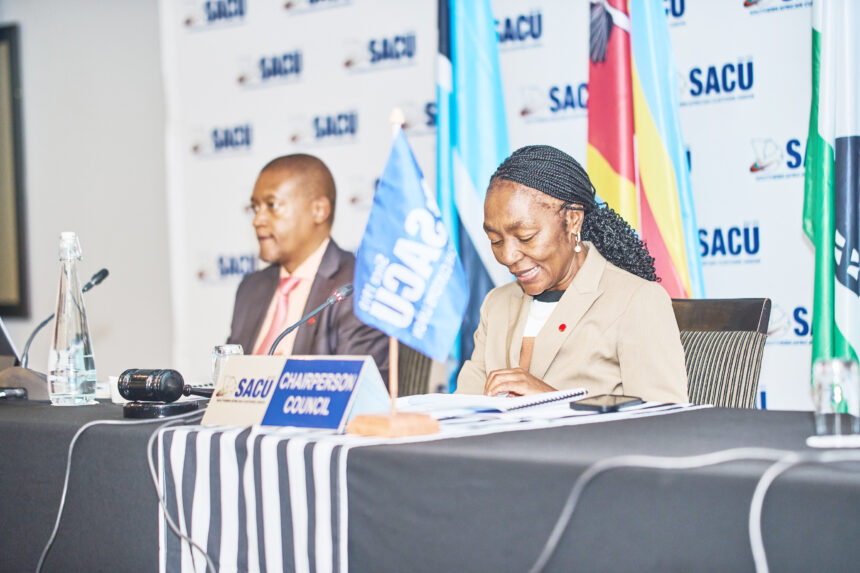The Southern African Customs Union (Sacu) says it is ready to engage the United States of America (USA) to find an amicable solution to trade concerns.
Part of a possible solution touted by Sacu urges the USA to contemplate observing differential treatment, specifically to consider exempting least – developed countries (LDCs) and African Growth and Opportunity Act (Agoa) – eligible countries from president Donald Trump’s tariff measures.
Chairperson of the Sacu Council of Ministers and Namibian finance minister Erica Shafudah said in a statement released this week the southern African trade bloc intends to seek cooperative solutions that promote mutually-beneficial trade and investment relations, as well as preserves existing supply chains.
The statement comes after Sacu, the oldest customs’ union in the world, noted with concern the rise in unilateral measures that fragment global trade, including the recent decision by the United States’ administration to introduce high global tariffs across the board. The broad-based global tariffs came into effect on 9 April 2025 and had significant implications, not only for exports to the United States, but for the entire multilateral trading system.
“While recognising that the reciprocal tariffs have been paused for 90 days (effective until 9 July 2025) and a universal 10% will now apply in the interim, the uncertainty for Sacu exports to the US remains. There is therefore a need to address this issue as a matter of urgency,” Shafudah stated.
She added that given the historical ties between the African continent and the US and Sacu member states in particular, the US is not only a strategic partner, but also remains one of Sacu’s biggest trading partners.
Shafudah said the economic relations between Sacu and the US have largely been administered through the Most Favoured Nation (MFN) principle; and African Growth and Opportunity Act (Agoa) and the US Generalised System of Preference (GSP), unilateral preferential schemes which provide duty-free treatment to designated beneficiary countries. These unilateral frameworks have contributed significantly to mutually beneficial trade relations that have promoted US investments, intra-industry supply-chains between the two sides that have fostered economic development, job-creation and industrial growth.
“The US’s unilateral action to raise tariffs without prior consultations with the affected members states is a departure from the norm, and will have significant implications on global trade and the foundational principles of the multilateral trading system. For the Sacu region, the imposition of tariffs would reverse the gains made with the US, which supported to lift millions out of poverty on the continent. Further, the tariffs risks transforming exports from predominantly more value-added manufactured to a more extractive relationship,” Shafudah stated.
Sacu member states reaffirmed their support for a predictable, development-oriented, transparent, fair, inclusive and rules-based multilateral trading system with the World Trade Organisation (WTO) at its core. Through this affirmation Sacu members acknowledged the critical role the WTO has played in fostering global economic growth and encouraged the organisation to serve as a forum for dialogue to help prevent escalating trade conflicts and to utilise the world organisation for constructive engagements.
Sacu members also emphasised the urgent need to reform the WTO to address existing imbalances and provide policy space for Africa’s industrialisation.
“In order to preserve the internal market, Sacu members will ensure that in any efforts to conclude partnerships with the US, the common external tariff is preserved, and due regard is taken not to undermine regional industrial capabilities. The Sacu members also commit to prioritise the implementation of the AfCFTA; including finalising the outstanding rules of origin on clothing and textiles, and automotive; the development of regional value-chains to set Sacu on a more sustainable development trajectory and to coordinate export strategies to leverage existing trade agreements that Sacu is party to,” Shafudah stated.
Meanwhile, the US and China on Monday agreed to reduce tariffs for 90 days in a bid to de-escalate the global trade war that has decimated financial markets and exacerbated fears of a global economic downturn.
Despite the US and China calling Monday’s development a joint agreement, some economists interpret it as the Trump administration reversing the tariffs. This is according to Janka Oertel, director of the Asia programme at the European Council on Foreign Relations.
“We are back to square one, now negotiations can begin. The outcome is uncertain, but China is in a psychologically stronger position now than before,” said Oertel. – ebrandt@nepc.com.na


